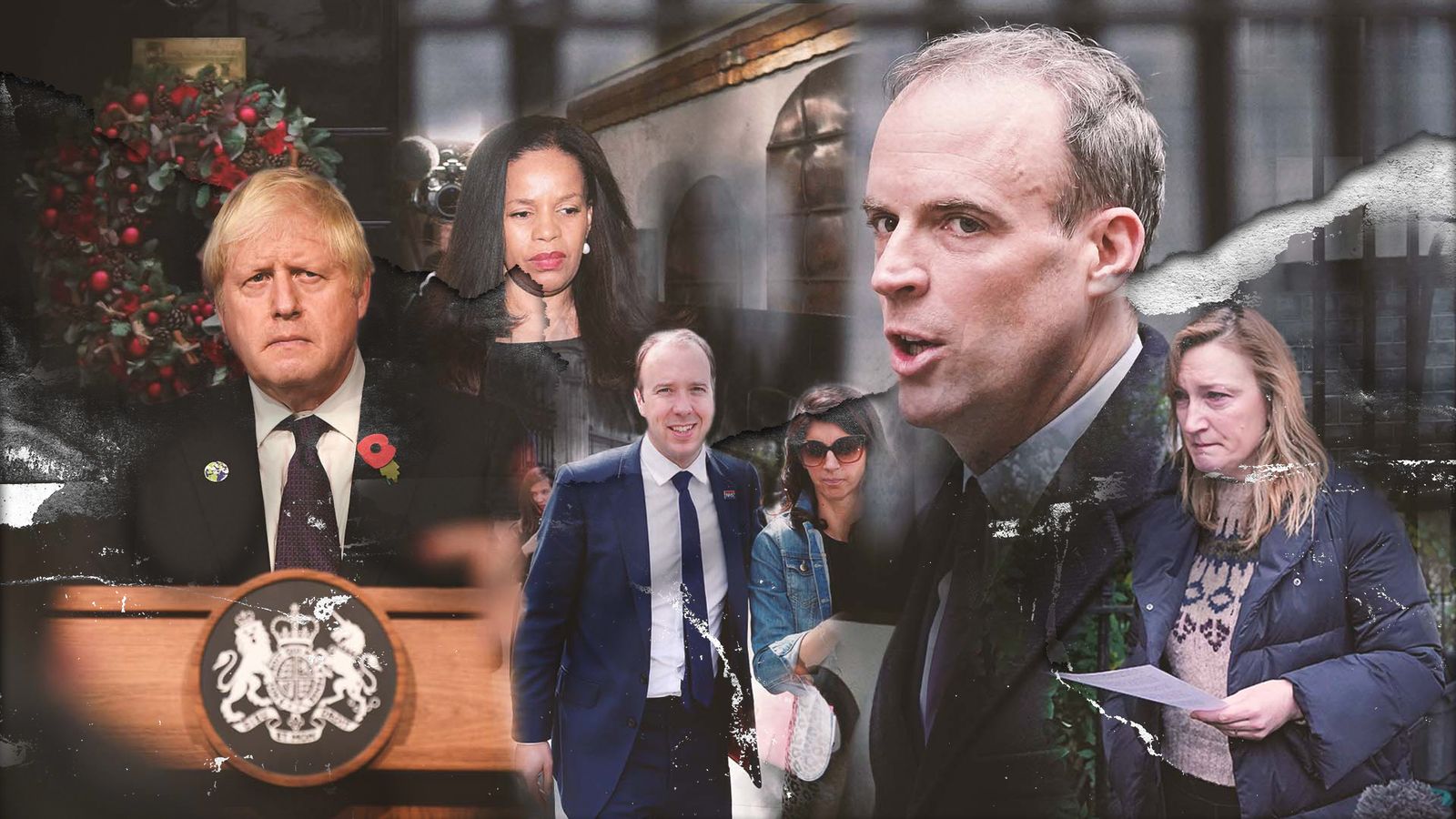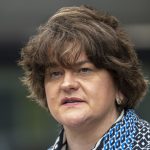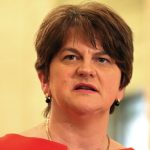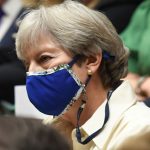The Downing Street Christmas party furore has capped a year of notable political scandals.
All eyes have been on the Conservatives as 2021 draws to a close, but they were not the only party to have been hit by embarrassing events.
Scandals are “inevitable” for the party of government for more than 10 years, says historian and author Sir Anthony Seldon, and none have been a tipping point. However, they could be if they continue, he says.
Sir Anthony told Sky News: “It’s very hard to keep going for more than 10 years in power without scandals breaking out.
“It happened to the Tories, particularly in ’62, ’63, over Profumo and other sex scandals, it happened in ’94, ’95 over a series of sex scandals and sleaze with cash for questions with John Major, it’s happening now to Boris Johnson,” he said.
War minister John Profumo lied about having an affair with Christine Keeler in 1961, ultimately bringing down Harold Macmillan’s government
“It’s almost inevitable for long-serving governments because they get out of touch with the electorate, there’s a sense of entitlement and also the patience of the public and the media is eroded,” Sir Anthony added.
“They’re fed up and not willing to give politicians the benefit of the doubt.”
He said it is a pattern but added: “We’re not yet at a tipping point, to me there’s been no smoking gun here.
“If Boris Johnson had been seen to do something personally corrupt I think he’d be in a very different position.
“We’ll see what the new year brings, I don’t see this as terminal as it was for the Tories at the end of the early ’60s or in the mid-90s but if it carries on that tipping point will be reached.”
Christmas party scandal a ‘defining moment’
Professor Vernon Bogdanor, professor of government at King’s College London, said he thinks the Christmas party scandal “could be a defining moment” for Mr Johnson.
“It shows that those in government feel entitled to break the rules which ordinary people have been observing,” he told Sky News.
Please use Chrome browser for a more accessible video player
He added that the PM “made a mistake” in trying to defend Owen Paterson as it “again appeared that those in positions of authority were not observing the rules they had laid down for others”.
Prof Bogdanor added that Mr Johnson was chosen as Conservative leader because he “was an election winner” but that is now not so clear as, in reference to the recent by-election loss, “if North Shropshire can be lost, no seat is safe”.
A timeline of 2021’s political scandals
February onwards: COVID contracts
In February, a High Court judge ruled that then-health secretary Matt Hancock acted unlawfully when his department did not reveal details of pandemic contracts it had signed under emergency procedures.
In the same month the use of 10 million sterile surgical gowns from a US firm (paid £70m) was suspended due to packaging concerns, while 1.12m masks had to be withdrawn as they did not meet safety standards.
The medicines regulator also launched an investigation into a £30m COVID contract awarded to a firm owned by a man who used to run a pub near Mr Hancock’s old constituency home who had no history of medical goods.
In November 2021, a leaked government document said 47 companies were referred by seven Tory MPs and peers through a fast-track “VIP lane” which awarded funding at a rate 10 times higher than other routes.
Campaign Group Transparency International UK said £255m of contracts were awarded to companies that had only been incorporated within the previous 60 days, while some contracts were given to companies with no previous knowledge of the product they were supplying.
Labour said the VIP lane was evidence of a “chumocracy” but the government said recommendations came from politicians of all parties and all offers had to go through the same selection process, with final decisions taken by expert officials not politicians.
March: Liverpool council corruption
A government investigation into Liverpool City council was published in March after former Labour mayor Joe Anderson was arrested in December 2020, along with four others, over claims of bribery in relation to building contracts, and witness intimidation.
The damning verdict found one of the UK’s most powerful councils had a “rotten culture” of dubious contracts and backroom bullying, with staff silenced and official records dumped in skips.
The historically anti-Tory city did not oppose the government’s investigation but fears Labour would lose the mayoralty were unfounded when the party’s Joanna Anderson, no relation to the ousted mayor, won in May.
March to November: Priti Patel bullying claims
A Whitehall inquiry into bullying accusations against Priti Patel was launched in March following allegations against the home secretary from across her time at three government departments.
Questions about her conduct arose after the Home Office’s most senior civil servant, Sir Philip Rutnam, resigned in February after reports of a bitter feud with Ms Patel.
He said he had received allegations of her “shouting and swearing, belittling people, making unreasonable and repeated demands”, and argued her behaviour “created fear”.
Other allegations were made at the same time, including a senior Home Office official once collapsing after being confronted by Ms Patel and an official receiving a £25,000 payout after making bullying claims against Ms Patel when she was employment minister.
The report was finally published in November, with the PM accused of sitting on the report since the summer and also watering it down.
Sir Alex Allan, who was leading the investigation, resigned in November after Mr Johnson overruled his conclusion that Ms Patel breached the ministerial code.
March: Sturgeon/Salmond controversy
Scotland’s first minister was embroiled in a blame game over whether she interfered in civil and criminal investigations into sexual assault allegations against former first minister Alex Salmond.
He was arrested in January 2019 and charged with 13 counts of sexual assault, including attempted rape, while he was first minister, but was cleared of all charges in 2020.
Mr Salmond accused leading SNP figures of trying to damage him and send him to prison, while Ms Sturgeon accused him of peddling false conspiracy theories.
An inquiry found the Scottish government’s actions had been “seriously flawed” and Ms Sturgeon misled their inquiry while giving evidence.
Another inquiry concluded in March 2021 and cleared Ms Sturgeon of breaching the code but said she had given an “incomplete narrative of events” to MSPs, but this was a “genuine failure of recollection” and not deliberate. It found she had not intervened in the investigation into Mr Salmond.
March and July: Cameron-Greensill scandal
An investigation was launched in March into former PM David Cameron’s lobbying activities on behalf of Greensill Capital, which collapsed that month.
Mr Cameron, who started working for Greensill two years after finishing as PM, texted Chancellor Rishi Sunak to get rules changed so Greensill could provide COVID loans (which failed) and held ten online meetings with permanent secretaries.
The report, released in July, concluded that Lex Greensill was given “extraordinarily privileged” access to Downing Street and Mr Cameron “understated” his relationship with Greensill when lobbying officials.
Labour accused Boris Johnson of covering up the scandal and called the report “a whitewash”.
April: Downing Street flat refurbishment
The refurbishment of Number 10 Downing Street caused an uproar in April after it was claimed £88,000 was spent on furnishing the four-bedroom flat where the PM and his then-fiancée Carrie Symonds live.
The PM was accused of using a £58,000 donation by multimillionaire Tory donor Lord Brownlow to pay for the refurbishment, which reportedly included £840-a-roll gold wallpaper from top designer Lulu Lytle, who co-founded Soane Britain, the decorating company favoured by Prince Charles, Mick Jagger and leading socialites.
Following an investigation, a report concluded Mr Johnson did not breach the ministerial code and there was no conflict of interest.
However, in December, the Electoral Commission fined the Conservative Party £17,800 for improperly declaring donations by Lord Brownlow’s company Huntswood Associates for the refurb.
Its investigation found the PM had WhatsApped the Tory donor in November 2020 requesting additional money from a trust that had not yet been set up to fund the refurb.
Mr Johnson was embroiled in yet another scandal as he told Lord Geidt in the previous investigation he “knew nothing about such payments until immediately prior to media reports in February 2021”.
May and November: Rob Roberts
The MP for Delyn in North Wales was found by an independent parliamentary panel to have sexually harassed a male member of his staff who said Mr Roberts had repeatedly propositioned him.
Mr Roberts apologised, had the Conservative Party whip removed and his membership suspended for 12 weeks – twice the recommended time.
He was given his membership back in November, which caused much outrage, but the whip was not returned so he remains an independent.
Because he was suspended by an independent panel instead of a parliamentary committee, a loophole meant he was not subject to a recall petition.
MPs angered by the matter voted to change the rules so members suspended for offences including sexual harassment or bullying can now face a recall petition – but they voted against Labour’s proposal to make the rule change retrospective.
May: Dominic Cummings revelations
The PM’s beleaguered former adviser gave evidence to MPs for seven hours on the lessons learned since the beginning of the pandemic.
He made a series of damning allegations, including that the PM did not chair early COBRA emergency meetings because he thought COVID was like “swine flu” and Mr Johnson considered asking Professor Chris Whitty to inject him with the virus to prove it was not serious.
Mr Cummings said it was “crackers” Mr Johnson was prime minister and said he heard the PM saying he would rather see “bodies pile high” than go into a third lockdown – which the PM has denied.
Please use Chrome browser for a more accessible video player
He also said Matt Hancock should have been “sacked for lying” on multiple occasions while the claim of a “shield” around care homes was “complete nonsense”.
The former adviser also said Carrie Johnson went “completely crackers” over a story about her dog and she was part of the reason he quit.
June: The Matt Hancock affair
It emerged the then-health secretary had breached his own social distancing rules with his adviser and university friend, Gina Coladangelo – who he was having an affair with.
CCTV footage showed them embracing and kissing in his Whitehall office in early May, when people from different households were advised to keep two metres apart where possible.
The father-of-three faced major criticism from politicians and the public before he apologised then quit and split from his wife of 15 years. He recently admitted the whole incident was a “failure of leadership”.
His appointment of Ms Coladangelo also came into question as it was claimed he failed to declare he had appointed her as an unpaid adviser.
August: Dominic Raab and Afghanistan
August saw not only the fall of Afghanistan but also the then-foreign secretary Dominic Raab, who faced criticism for being on holiday – and remaining so – as Kabul was taken by the Taliban.
Mr Raab was in Crete as his department worked overtime to help evacuate former British military translators and their families from the Afghan capital, with the minister later admitting he delegated crucial tasks, but insisting he was in constant contact before he returned.
The anger against Mr Raab, once viewed as a likely future Tory leader, resulted in his demotion during the cabinet reshuffle to justice secretary and what is widely seen as a consolation prize, he was also made deputy prime minister.
And in December a young Foreign Office whistleblower claimed he witnessed turmoil, incompetence and irrationality with potentially deadly consequences for Afghans.
Please use Chrome browser for a more accessible video player
Raphael Marshall told MPs when Mr Raab came back from holiday on 16 August there was little improvement in the situation, with junior staff with no experience or knowledge of Afghanistan asked to make life-or-death decisions.
He said Mr Raab took “hours to engage” when asked to personally approve exceptional cases in the final days of the evacuation effort and then returned the files, asking for them in a different spreadsheet format.
Mr Marshall said he believes the delay that caused meant some never made it to the airport.
October: Angela Rayner ‘Tory scum’
During a fringe event at the Labour Party conference, Labour’s deputy leader Angela Rayner called Conservative ministers “a bunch of scum” and said Mr Johnson was a “racist, homophobic, misogynist”.
She initially refused to take back her remarks, but after an uproar, during which she had death threats sent to her, she apologised.
“I was angry about where our country is headed and policies that have made life harder for so many people I represent,” she said.
“But I would like to unreservedly apologise for the language I used, and I would not use it again.”
October: MP Claudia Webbe guilty of harassment
The Leicester East MP, who is an independent after being suspended by Labour, was found guilty in October of harassing her partner’s friend and was sentenced to 10 weeks in custody, suspended for two years, plus 200 hours of unpaid work.
Webbe, 56, threatened to throw acid at Michelle Merritt, to send naked pictures of her to her family and made threatening phone calls to Ms Merritt under the guise of lockdown having to be “adhered to strictly”.
The chief magistrate described her actions as “callous and intimidatory” and called her explanation “frankly incredible”, saying: “I do not believe it.”exoerti
Webbe continues to be an MP despite a senior Labour MP reiterating calls for her to resign. She denies the allegations.
October: Owen Paterson lobbying
Former minister Owen Paterson was found to have breached lobbying rules after a three-year investigation by the cross-party standards committee.
But Conservative MPs were told to reject him being suspended for 30 days and for a new standards committee to be created.
However, some Tories rebelled and there was an outcry from opposition politicians, which resulted in a U-turn by the government the following day before Mr Paterson quit, saying the pressure on his family was too much.
November: Sir Geoffrey Cox and his multiple jobs
As the spotlight was shone on MP’s standards by the Owen Paterson affair, MP’s second jobs came under scrutiny – especially Sir Geoffrey Cox as the highest-earning MP from a second job.
The former attorney general is a practising barrister whose work for the British Virgin Islands government was of particular concern for critics, as well as the fact he used COVID proxy vote rules to work in the Caribbean for a month in April and allegedly used his parliamentary office for legal work.
Labour called for an investigation into Sir Geoffrey’s multiple second jobs, which earned him nearly £900,000 last year, and called for his resignation.
The veteran MP insisted he does not believe he has broken Commons rules but would “fully cooperate” with an investigation. He said the Parliamentary Standards Commissioner has declined to open an investigation.
Please use Chrome browser for a more accessible video player
November: Cash for honours
A Sunday Times report in November showed 15 of the last 16 Conservative Party treasurers have been offered a seat in the House of Lords having each donated more than £3m to the Tories.
They include Lord Cruddas, who took his seat after Mr Johnson rejected the advice of the House of Lords Appointments Commission not to grant him a peerage.
An ex-party chairman was quoted by the newspaper as saying: “The truth is the entire political establishment knows this happens and they do nothing about it… The most telling line is, once you pay your £3m, you get your peerage.”
Ministers said the peers are philanthropists who provide “valuable” expertise to the House of Lords.
Opposition parties urged the Metropolitan Police to launch an investigation, with Labour saying it was “now clear the cash for access culture at the heart of this Conservative government stems from the top”.
December: 2020 Christmas parties
It may have been a year late, but allegations ministers, including the prime minister, and senior staff had Christmas parties in 2020 while London was under Tier 2 and 3 restrictions (no household mixing indoors) caused an uproar.
At first, it was a party in Downing Street on 18 December 2020, which about 40 staff attended, then the allegations of parties kept coming.
Please use Chrome browser for a more accessible video player
They include claims of a “virtual” Christmas quiz which the PM took part in involving staff huddling around computers and drinking, a party at Mr Johnson’s flat, drinks at the Treasury Office in November and a leaving party at Downing Street in November.
The Department for Education has admitted it held a party in its offices which was attended by then-education secretary Gavin Williamson and Conservative London mayoral hopeful Shaun Bailey admitted attending a “gathering” at his campaign office.
Cabinet Secretary Simon Case was tasked with investigating some of the events but it was then claimed he attended a drinks party with Whitehall staff himself, which he denied.
Investigations are ongoing.






















